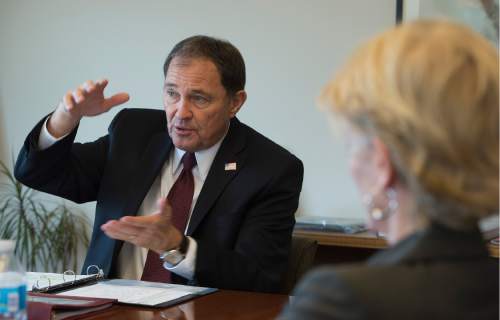This is an archived article that was published on sltrib.com in 2015, and information in the article may be outdated. It is provided only for personal research purposes and may not be reprinted.
Imagine getting your paycheck and having a line item that wipes out 43 percent of it — pulling the money out and earmarking it for, say, your car payment.
That's kind of the system that the Utah Legislature has created with the state budget. This year, the General Fund, made up of sales tax, mining royalties and liquor sales, is expected to grow by about $180 million.
But $77 million of that money will automatically be socked away before the Legislature sees it. It will be added to a growing pool of money — $653 million in the coming budget year, or 20 percent of all the state dollars not dedicated to education — to be used for road projects, water projects and other smaller uses.
"Unfortunately, over time, I think the Legislature has handcuffed themselves by taking away flexibility by earmarking money. It may be a very good place to put it, but there ought to be a discussion about it," Gov. Gary Herbert said during a recent interview. "We're coming to a point where there's a crossroads decision, because if we don't reduce some of the earmarks, we will have a difficult time funding education, particularly higher education."
Herbert traditionally has opposed legislative earmarks and last year wanted to start chipping away at the increasing earmarked dollars, but he was rebuffed by the Legislature.
This year, the governor wants to take $10 million out of the earmarked funds and put it to early interventions for at-risk children — ideally full-day kindergarten for these youngsters.
It could once again be a scuffle with legislators when they convene for their 2016 session next month, but he could have some help, at least for part of the goal.
Rep. Dan McCay, R-Riverton, is having legislation drafted that would do away with all nontransportation earmarks, pushing about $90 million back into the General Fund where legislators can spend the money as they see fit.
That would mean wiping out about $36 million for water projects, $8 million in tobacco taxes earmarked for anti-smoking campaigns and cancer research, $5 million in liquor taxes dedicated to alcohol law enforcement, and $18 million to help attract tourists to the state.
McCay is a member of the Tax Review Commission, which recommended last month doing away with transportation and water earmarks. McCay's bill would leave the road earmarks — about 85 percent of the earmarked dollars — untouched.
The problem with earmarking money is there is not the regular review of whether the dollars are actually being spent efficiently, said McCay, who also is chairman of the House Revenue and Taxation Committee.
"The problem with earmarks is no one has been looking at them," he said. "Those funds go straight to the various departments or wherever they're appropriated, and rarely do they ever get more than a cursory review."
But Sen. Stuart Adams, R-Layton, who in recent years sponsored a major transportation earmark that was passed despite Herbert's veto — said channeling the money to road projects has given the state a useful cushion that helped keep the state budget whole during the recent recession.
Adams said putting money into roads rather than pumping it into new state programs means that when the economy goes in the tank, the state can slow down or pause road construction. If it was being spent on programs and salaries, the programs would have to be shut down and people would be laid off.
"Transportation has been historically that accordion that we put money into and then take it out of when the budget either swings down or up," said Adams, a former chairman of the state Transportation Commission.
About 17 percent of the sales tax comes from automotive and transportation sales, so the target is to make sure that about that much of the sales tax revenue goes into building and maintaining roads. It is slightly higher than that level now.
Adams notes that the largest earmark in the budget is the provision in the state Constitution that requires all of the state income tax to go directly to education.
"No one would say we shouldn't earmark income tax money for education, and I'm not sure anyone would say you ought to throw all that on the table and let it compete against other needs," Adams said. "I just think earmarks have this bad connotation, like somehow it's a pet project."
Education and transportation are, Adams said, two of the most basic functions for state government, and while they are not sacred cows, he says they have broad public support and likely will continue to receive reliable funding.
Twitter: @RobertGehrke



